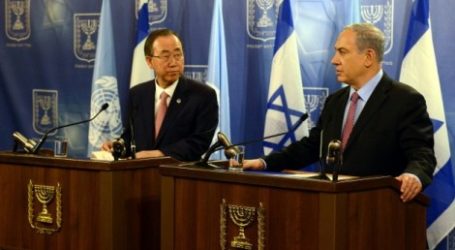OBAMA CALLS FOR HALT TO IRAN SANCTIONS
 Washington, 22 Dul Hijja 1434/26 October 2013 (MINA) – Amid the ongoing US-Iranian détente, the Obama administration has urged Congress to halt any new sanctions on the new Iranian government led by Hassan Rouhani.
Washington, 22 Dul Hijja 1434/26 October 2013 (MINA) – Amid the ongoing US-Iranian détente, the Obama administration has urged Congress to halt any new sanctions on the new Iranian government led by Hassan Rouhani.
“So while we understand that Congress may consider new sanctions, we think this is a time for a pause, as we asked for in the past, to see if negotiations can gain traction,” said State Department Spokesperson, Jen Psaki Friday.
Psaki: “We think this is a time for a pause, as we asked for in the past, to see if negotiations can gain traction.” She said that the administration’s position was conveyed to US congressmen Thursday during a meeting at the White House, Anadolu Agency reported as monitored by Mi’raj News Agency (MINA).
The request comes as the P5+1 group of world powers, which includes the US, are engaged with Iran in delicate negotiations over its nuclear program. The next round of talks is scheduled for November 7.
Psaki added, “We think that the flexibility right now would be helpful in putting a pause on sanctions to see if this process will work out, moving forward.”
Even as the administration calls for a hiatus on new sanctions, it remains open to the possibility of increasing the sanctions regime should there be a lack of progress in negotiations.
“There’s always time for sanctions in the future as needed, but this is an ask we’re making to Congress now,” remarked Psaki.
On December 31, 2011, U.S. President Barack Obama tightened American sanctions on business with Iran. The sanctions are intended to deprive the Iranian nuclear program of the funding it needs to continue.
While the United States has had some sort of sanction levied against Iran for most of 30 years, few of them have levered Iran into compliance with international rules regarding terrorism or nuclear energy. By early 2012, however, evidence appears to be mounting that sanctions — both by the U.S. and its global allies — are hurting Iran.
Most of the current sanctions cut into Iran’s oil exports, which account for 85% of the country’s export revenue. Iran’s repeated threats to close the Strait of Hormuz (itself a vital oil conduit) to international use indicates that Iran is kicking at global oil usage to relieve pressure on its own oil industry.
Carter Years
In the midst of the crisis, in 1980, the United States broke diplomatic relations with Iran. It has never been restored.
The U.S. also levied its first round of sanctions against Iran during the crisis. In 1980, Carter banned imports of Iranian oil, froze some $12 billion in Iranian assets in the U.S., and later banned all U.S. trade with and travel to Iran. The U.S. lifted the embargoes after Iran released the hostages.
Sanctions Under Reagan
In 1983, the Reagan Administration declared Iran a state sponsor of terrorism. As such the U.S. opposed international loans to Iran.
When Iran began threatening traffic through the Persian Gulf and Strait of Hormuz in 1987, Reagan authorized naval escorts for civilian ships, and he signed a new embargo against Iranian imports.
The United States also banned the sale of “dual use” items to Iran. Dual-use items are civilian goods with the possibility of military adaptation.
The Clinton Years
In 1995, with Iran still labeled a state sponsor of terrorism and amid widespread fear Iran was pursuing weapons of mass destruction, President Bill Clinton expanded U.S. sanctions against Iran. He prohibited all American involvement with the Iranian petroleum industry. In 1997 he banned all American investment in Iran as well as what little U.S. trade remained with the country. Clinton also encouraged other countries to do the same.
Sanctions Under George W. Bush
Under President George W. Bush, the United States repeatedly froze the assets of people, groups, or businesses identified as helping Iran sponsor terrorism, destabilize Iraq, or work on weapons programs. The U.S. also froze the assets of foreign entities believed to be helping Iran in those areas.
The United States under Bush also banned so-called “U-turn” financial transfers involving Iran. According to the U.S. Treasury Department, a U-turn transfer involve Iran but “originate and end with non-Iranian foreign banks.”(T/P04/E1)
Mi’raj News Agency (MINA)





